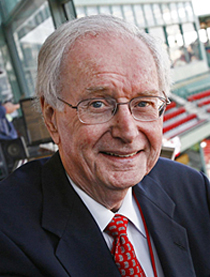
Culture
Some preservationists and neighborhood groups objected to tearing down the old park. Why not just fix it up, they argued?

Flavin
Twenty one years ago this month the Red Sox gathered the media together to make a major announcement. There would soon be a brand new Fenway Park!
It would be right across the street from the old one, and its features would include: the same field measurements as the original, a left field wall, a Pesky pole, and bullpens in front of the right field bleachers. The field would even be faced in the same direction, so the sun would set behind the third base grandstand, just like it always had.
Oh, there would be some changes: the new park would have three decks, it would seat 10,000 more people than the current park then did, and it would have wider aisles and seats. There would be two large parking garages built as part of the development.
The grand announcement even featured artists' renderings and scale models of the new park. There were plans to convert a portion of the old park, including part of the Green Monster, into a museum.
A few details remained to be worked out, such as how much public money would be needed for the construction and what the cost of acquiring the necessary land (a lot of it by eminent domain) might be. But those, we were assured, were just particulars. The target date for the new park was Opening Day of the 2003 season.
It was a done deal. Well, almost.
Some preservationists and neighborhood groups objected to tearing down the old park. Why not just fix it up, they argued? But those then running the team countered that, between logistics and expenses, it simply wasn't feasible. "A new park just made good business sense," was the mantra.
The wheels were in motion. But they were also in motion on another front. The Red Sox were for sale.
Fast forward two and a half years. After a good deal of bobbing and weaving by a myriad of prospective buyers, final offers for the team and its ballpark were submitted in December 2001. The group headed by John Henry, Tom Werner, and Larry Lucchino was not the high bidder.
The high bidder was Charles Dolan, the founder of Cablevision. He had made an offer of $20 million more than the Henry/Werner group. But Dolan had a problem; his brother, Larry Dolan, already owned the Cleveland Indians. There was an issue of potential conflict of interest if two rival teams were owned by the same family. Resolving it could hold up the sale for years, the Red Sox selling owners, the Yawkey Trust, voted unanimously to accept the Henry/Werner offer of $700 million. That was at the time more than twice as much as the selling price of any other franchise, but by today's standards (the Red Sox are currently valued at $3.3 billion) it was a steal.
The new owners were publicly committed to saving and restoring the original Fenway Park, the only bidders who had pledged to do so. As a result, the plans to build a new one were shelved.
After more than a decade of work and $300 million in costs, Fenway Park, once run down and out of date, emerged as baseball's crown jewel, a major tourist attraction, and one of the city of Boston's greatest assets. The team in itself has achieved unrivaled success under the stewardship of the present owners with four World Series championships.
But it's worth thinking for a while about what could have happened if Charles Dolan's offer had been accepted and eventually approved. The new Fenway Park, with wider seats and aisles than the old one, but none of the history and mystique that make the original one such a treasure, would probably be a reality.
It would be much like the new Yankee Stadium, with all the bells and whistles a new park can offer, but lacking the magic of the real thing, where Ruth, Gehrig, Joe DiMaggio, and Mickey Mantle once roamed. That is gone forever. The new Yankee Stadium is a replica. It's built to look the same as the old one, but it is not. It is, in effect, the world's largest Tussaud's Wax Museum. Maybe it made business sense to build it and, in the process, to tear down the tradition and the memories that the original Yankee Stadium represented, but baseball is far more than just a business.
Moreover, if Charles Dolan had won the bidding for the Red Sox he'd in all likelihood have done what he did with the other sports teams in his financial empire; he'd have turned control of the Sox over to his son. James L. Dolan now runs Madison Square Garden and is, by extension, the owner of, among others, the New York Knickerbockers of the NBA and the Rangers of the NHL.
James Dolan's stewardship of the Knicks has been an utter disaster both on and off the basketball court. In the last 19 years, the years in which the Henry/Werner group has owned the Red Sox and won four championships, the Knicks have had only four seasons in which they've won more games than they lost. This season their record stood at 21 and 45 when play was suspended, but at least that was up from last year when they finished at 17 and 65. Media access to Dolan has been greatly restricted and he has been involved in all kinds of public relations boondoggles, most of them his own doing.
In 2017, Charles Oakley, a popular Knicks player from the the pre-Dolan era, was, by Dolan's order, forcibly removed, then arrested and banned from Madison Square Garden because Oakley, who has been critical of Dolan's ownership, was seated too close to him at a Knicks game. Shortly before this season was suspended, movie producer/director Spike Lee, a famously rabid Knicks fan and season ticket holder, was denied access to a Knicks game through the gate he'd been using for 20 years because he'd been critical of Dolan. Lee says he's now done with going to Knick games. Several polls, including one by Sports Illustrated, have named James Dolan as the NBA's worst owner. Fans at Knicks games often break out into chants of "Sell the team! Sell the team!"
There, but for the grace of God, go us. Boy, we dodged a bullet on that one.
- Dick Flavin is a New York Times bestselling author; the Boston Red Sox "Poet Laureate" and The Pilot's recently minted Sports' columnist.
Recent articles in the Culture & Events section
-
Scripture Reflection for April 14, 2024, Third Sunday of EasterDeacon Greg Kandra
-
St. Helena's House is established in the South EndThomas Lester
-
Is this synodality?Russell Shaw
-
Poking the hornet's nest of IVFFather Tadeusz Pacholczyk
-
A eucharistic word: MissionMichael R. Heinlein


















